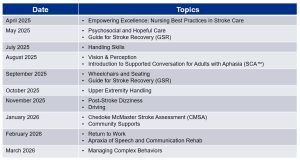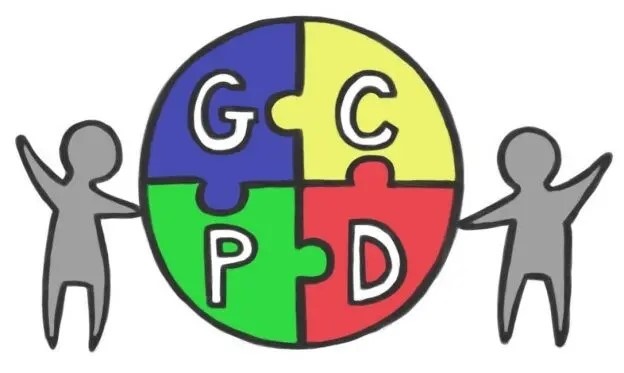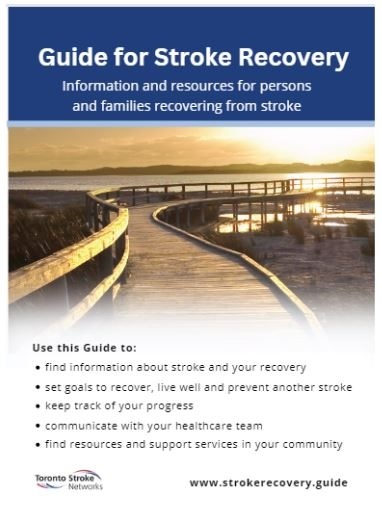The Toronto Stroke Networks (TSN) work collaboratively with regional partners to enable a cross-systems approach to knowledge translation (KT). This KT approach assists organizations in the standardization and implementation of stroke best practices and involves a variety of professional development activities for healthcare providers. Below you will find resources and opportunities to support your professional development.
The Orientation to Stroke Care in Toronto is a comprehensive resource designed to introduce the stroke system in Toronto. This document will:
Target Audience: Healthcare providers working across the stroke continuum of care in Toronto.
To access The Orientation to Stroke Care in Toronto, click here (login required)
The Toronto Stroke Networks host various events and workshops throughout the year to support implementation of best practice stroke care. Many of these workshops are offered multiple times per year. To learn more about these opportunities refer to the descriptions below.
To view a list of all current events, refer to our events calendar. If the event date has passed or you would like more information contact us at info@tostroke.com
The schedule below outlines the educational opportunities for the fiscal year 2025–26. Please note that dates and topics are tentative and may be subject to change. For the most up-to-date information and event details, visit our homepage under "Upcoming Events" or check the Events Calendar page.

This 5-part workshop features expert insights on mood, anxiety, and depression after a stroke. It provides education on best practices, screening tools, practical strategies and resources to support patients with post-stroke mood changes.
Below are the archived recordings from the workshop day:
Part 1: Mood, Depression and Anxiety Post Stroke
Part 2: Stroke Best Practice Recommendations for Mood Screening
Part 3: Non-Pharmacological Treatment Approach
Part 4: March of Dimes
Part 5: Stroke-Specific Resources
A provincially recognized workshop that equips clinicians with knowledge and skills to motivate change in patients/clients for better health outcomes. Application of the Guide for Stroke Recovery has been integrated into the session.
This 1-hour workshop equips clinicians with knowledge and skills to: introduce the GSR and describe its value to persons with stroke, families/ caregivers; support persons with stroke to manage their care and recovery with the use of the GSR; and support patient education, goal setting, transitions of care, and community reintegration.
Participants are provided with Strategies to Introduce the GSR in Clinical Practice and Tips for Implementing the GSR along with other useful information to introduce and promote the use of this resource.
An evidence-informed, multi-modal education and knowledge translation program for healthcare providers working in stroke care. The purpose is to improve the life experience of persons with stroke and their families/caregivers through focused attention on psychosocial care and promoting a culture of hopeful care.
To learn more, contact us at info@tostroke.com
If you would like to be added to our e-mail distribution list to receive updates on stroke education and other events, please email us at info@tostroke.com. Your email address will not be shared with any third party
Provincial Stroke Rounds are organized by the Ontario Regional Education Group (OREG). Typically these rounds are held on the first Wednesday of the month between 8-9 am and are virtual.
These rounds cover a variety of topics primarily focused on new or emerging best practice research in a variety of stroke care areas (assessment, treatment, prevention, etc).
To participate, please contact your Ontario Regional Education Group (OREG) representative.
Wearable Technology to Monitor Movement and Optimize Stroke Rehabilitation and Recovery
December 2025
Presenter: Dr. Marika Demers, erg., PhD, Professeure adjointe, École de Réadaptation, Faculté de Médecine, Université de Montréal.
Stronger Together After Stroke: Impacts of Strength Training and Lived Experience
November 2025
Presenter: Dr. Ada Tang, PT PhD and Dr. Kenny Noguchi, PhD
Challenges in managing hemodynamic stroke: a multidisciplinary approach to chronic steno-occlusive arterial disease
October 2025
Presenter: Dr. Joanna Schaafsma, MD PhD, Vascular Neurologist
Building Awareness: Helping Kids Understand Stroke and Aphasia
June 2025
Presenter: Lisa Samson, M.H.SC. SLP (C) REG. CASLPO and Alessandra Peretti, BSW, RSW, INHC
Non-atherosclerotic Carotid Bifurcation Diseases: Phenotypes and their Management
May 2025
Presenter: Dr. Ravinder-Jeet Singh
Baby Shower - A Stroke Rounds on Pregnancy and Stroke
April 2025
Presenter: Dr. Robert Sarmiento
Review of Artificial Intelligence in the Diagnosis and Management of Stroke Patients Across the Province
Feb 2025
Presenter: Dr. Andrew Micieli
The Role and Contributions of Nurses in Stroke Rehabilitation Units: An Integrative Review
Dec 2024
Presenter: Dr. Eric Tanlaka and Dr. Amanda McIntyre
Systems of Care for Acute Stroke in Ontario
Nov 2024
Presenter: Dr. Amy Yu MD MSC FRCPC
Making Stroke Education Fit For Purpose: Priorities and Approaches for Educating Healthcare Professionals
Oct 2024
Presenter: Kristina Moro
Balancing stewardship and quality in stroke dysphagia management: Updates on an online independent TOR-BST© screener training program - June 2024
Presenters: Sherry Darling and Dr. Rosemary Martino
A Journey to the Centre of the Brain: A Novel Technology to Explore the Inside of Brain Vessels and its Application in Stroke - May 2024
Presenter: Dr. Robert Fahed, MD MSc.
Note: This presentation was not recorded due to the images and videos taken with the camera inside brain vessels, and intellectual property restrictions. You can get an idea about this exciting technology by watching a short video: https://youtu.be/BXTulCWwZhA?si=i2rSptzrlTnTisxa
Amplifying the Patient Journey to Support Transitions in Stroke Care - April 2024
Presenters: Dr. Siva Murugappan and Dr. Prema Samy
Stroke/ICU Liaison: A New Collaborative Model for the Interdisciplinary Care of Stroke Patients - March 2024
Presenters: Dr. Federico Carpani and Dr. Keith Sivakumar
Enhancing Individualized Stroke Care in the Community - results of a community consultation in Southeastern Ontario - December 2023
Presenter: Kayla Purdon, Best Practice Coordinator
Integrated Stroke Clinic: An Innovative Patient Centric Approach to Stroke Care - November 2023
Presenter: Dr. Atif Zafar, Medical Director of St. Michael's Hospital Comprehensive Stroke Program
Newly Released Smart Tips for Stroke Care: Everything you Need to Know! - October 2023
Presenters: Sue Verrilli and Jenna Wick
Implementation of Virtual Care in an Outpatient Rehabilitation Setting - May 2023
Presenters: Karl Wong and Gary Siu
FAST Heroes Health Education Campaign Children Making a Positive Impact in Stroke - April 2023
Presenters: Dr. Razmik Bebedjian, Jan Van Der Merwe, and Keli Cristofaro
Optimizing transitions for older adults with stroke to support successful community reintegration and life after stroke - March 2023
Presenters: Dr. Maureen Markle-Reid, Eileen Britt and David Dayler
The Stroke Core Competency Framework - February 2023
Presenters: Sandy Lyeo and Jodi Powell
 Revised inpatient and outpatient rehab transition letters, along with aphasia friendly versions are now available, to support patients going to rehabilitation. Click here to access the letters
Revised inpatient and outpatient rehab transition letters, along with aphasia friendly versions are now available, to support patients going to rehabilitation. Click here to access the letters

The Provincial SSES is designed to supplement the the Stroke Core Competency Framework and support foundational stroke care knowledge for healthcare providers across the continuum of care. The SSES is comprised of 23 modules that are evidence-informed and aligned with the Canadian Stroke Best Practice Recommendations.
To access the Standardized Stroke Education Series, click here. (Login required)

The TSN SCA™ initiative aims to better equip healthcare providers to support patients with aphasia through the use of SCA™.
Click here to access the resources.

CO-OP is a performance-based, problem-solving approach that enables skill acquisition through a process of strategy use and guided discovery.
Click here to access the CO-OP Virtual Toolkit.

The COPM©️ is both a patient reported outcome measure (PROM) and patient reported experience measure (PREM) used by healthcare providers working in stroke care (acute, inpatient and outpatient rehabilitation).
Click here to learn more about the Toronto Stroke Networks’ COPM©️ Initiative and access resources to support utilization of this outcome measure.

This 20-minute e-learning module was designed for all clinicians working in stroke care. This course will help build your understanding of the GSR and the tools available to support its integration into clinical practice. This is a pre-requisite for the GSR workshop.
Check our events calendar to find out when the next workshop is being offered.
Click here to access the module.

Essential Professional Conversations (EPCs) or ‘warm handovers’ is a standard approach used within Toronto Stroke Networks to foster enhanced communication, learning and meaningful cross-system collaboration between healthcare providers at times of transition. To support implementation of EPCs, a new online orientation module has been developed for all healthcare providers working in stroke care.
Click here to access this resource.

A stroke competency series that presents nine guideline-based courses from stroke basics to urgent management, with an emphasis on excellence in quality care, this comprehensive series promotes healthcare team's skill, strategy, and performance, resulting in positive patient outcomes.
To register, please email: Toronto Stroke Networks

A free, short, online course, and a prerequisite to other training within the Aphasia Institute.
Click here to access this resource. Registration is required.

An evidence-informed educational program for those working in stroke care. The program aims to establish a core level of competency to meet the psychosocial needs of persons with stroke and their families/caregivers and promote a culture of hope.
Click here to access the 8 e-learning modules. Completion of all the modules is required to participate in the workshop.
Click here to access the Community Forum 2022 Archived Recording about Building Capacity in Psychosocial and Hopeful Care (login required)
To learn more contact Jocelyne.mckellar@uhn.ca

To support the provision and collection of Stroke Rehabilitation Intensity, a Rehabilitation Intensity Learning Module & Quiz was developed by the Ontario Regional Stroke Networks’ Rehabilitation Coordinator Group for inpatient rehabilitation programs that report to the National Rehabilitation Reporting System.
The Rehabilitation Intensity quiz is located at the end of the module. Since your program may have established structures for education completion and quiz tracking, connect with your manager prior to starting the quiz.
Click here to access this resource.

The resource highlights common changes due to stroke and strategies for managing these changes. This guide is intended for Personal Support Workers (PSWs) working in Long Term Care in Ontario. However, anyone interested in stroke care can benefit from using this resource, including PSWs in the community, family members, etc.
Click here to access this resource.

E-learning courses available to clinicians working in stroke care on topics related to stroke best practices. Registration required.
Click here to access this resource.
The Stroke Core Competency Framework (SCCF) is an accessible, comprehensive self-assessment tool that supports healthcare providers in identifying specific learning objectives to support stroke best practice implementation. It is designed for both new and experienced healthcare providers working across the continuum of stroke care. The SCCF was developed at a provincial level and has been adapted for use within the Toronto Stroke Networks and covers 24 competencies for all health care providers working across the continuum of stroke care.
To access the Stroke Core Competency Framework, click here.
These groups are designed to collaboratively optimize and, where possible, standardize implementation of profession-specific best practices across the continuum of care to improve patient outcomes. Each group meets virtually every quarter for one hour. Meetings are intended to facilitate conversations with an aim to: gain an understanding of current practices within their profession, look for opportunities to drive best practice, facilitate knowledge translation, share and collate resources and collaborate more broadly with other health care providers within a profession. Below are the four committees with contact information:
The Toronto Occupational Therapy Leadership Committee (cross-continuum clinicians)
Group leads:
Click here to access the committee page (login required)
The Toronto Physiotherapy Leadership Committee (cross continuum clinicians)
The inaugural meeting is February 2024
Group leads:
The Toronto Social Work Leadership Committee (cross continuum clinicians)
Group leads:
The Toronto/GTA Stroke Speech-Language Pathology Leadership Committee (cross continuum clinicians)
Group leads: